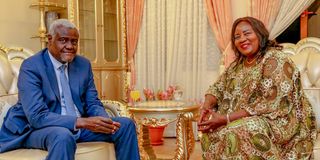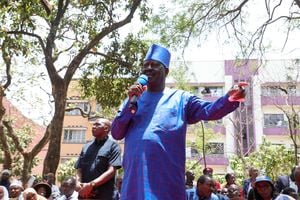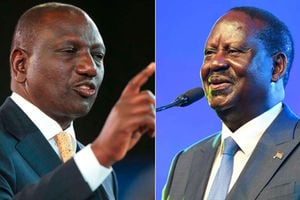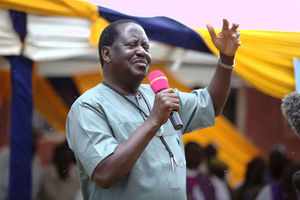
Azimio leader Raila Odinga.
Opposition leader Raila Odinga is yet to formally bid for the African Union Commission (AUC) chairperson’s position but he is lobbying African leaders to assess the strength of his candidature.
While the backing of the Kenyan government is instrumental, the Nation has established that Mr Odinga was also keen to first explore the prospects of his bid hence the decision to reach out to other member States of the AU.
Mr Odinga is understood to be relying on his networks in the continental body, having served as AU High Representative for Infrastructure Development in Africa between 2018 and last year in February, when his term ended controversially.
Only after he is assured that his candidature is strong enough will the former prime minister formally apply for the position, whose holder is the commission’s chief executive officer and legal representative of the AU.
“Yes, Raila is considering applying for the job pending consultations with other leaders across the continent,” a source familiar with the developments told the Nation yesterday.
The official sought to downplay suggestions that he was being fronted by the government.
“It is actually not for Kenya or any government to front a candidate. A candidate has to pick application forms and apply and hope that his country will not object,” explained the source who sought anonymity to freely discuss the development.
The Nation established that the Azimio chief was waiting for feedback from his emissaries to the African capitals to take the next step.
The AUC chairperson is a powerful position in the continental body.
Since the Head of State who is chosen to chair the AU has only a one-year term, the AUC chairperson is instrumental in ensuring the continuity of work at the AU.
Also Read: Raila Odinga's job at AU ends
The current AUC chairperson is Mr Moussa Faki Mahamat, Chad’s former foreign minister, who was elected in January 2017 and re-elected in February 2021. His term as chairperson ends in February 2025.
Yesterday and today, ministers of Foreign Affairs, who form the AU’s Executive Council, have been meeting in Addis Ababa, Ethiopia, in preparation for the Heads of State summit scheduled on February 17 and 18.
A draft agenda for the 37th Ordinary Session of the Assembly of the Heads of State and Government of the AU includes “appointment of Eminent Africans to oversee the pre-selection of the candidates for members of the Commission.”
A source at the commission said Mr Odinga had put together his bid and that Kenya had put together a campaign team to assess his chances and lobby for him.
The Assembly, which is composed of Heads of State and Government or their duly accredited representatives, elects the AUC chairperson and deputy chairperson.

African Union chairman Moussa Faki Mahamat when he paid a courtesy call on Mama Ida Idinga at her Kisumu residence.
The AUC’s chairperson has a four-year term, renewable once. Election is by secret ballot and a two-thirds majority of member States eligible to vote.
Yesterday, Azimio National Coalition Executive Council chairman Wycliffe Oparanya was non-committal on whether Mr Odinga had placed his bid for the AUC chairperson’s position.
“We have seen the information in the public domain and he (Mr Odinga) is at liberty to consider going for the position or not. What I’m sure of is that he has not reached out to Kenya Kwanza for support,” Mr Oparanya told Nation.
The former Kakamega governor said he was not privy to information that President Willima Ruto was vouching for Mr Odinga.
Mr Oparanya did not, however, respond to queries on whether the move would affect Mr Odinga’s future political plans.
ODM national treasurer Timothy Bosire claimed Mr Odinga was being offered the position by the AU itself, adding that President Ruto “would only endorse it as a formality.”
“He has held positions at that level before, and performed well, and nothing can stop him from holding the AUC post if he so desires,” said Mr Bosire.
He went on: “As a pan-africanist, it will be another opportunity to serve humanity. We can only pray for him as he also prepares to become the 6th president of Kenya come the 2027 elections.”
Asked how Mr Odinga would play local politics should he win the AUC post, he responded: “He will resign accordingly. Any legal complications will be sorted ahead, otherwise he will decline the offer.”
The National Assembly Defence, Intelligence and Foreign Relations Committee chairperson Nelson Koech said they would support any Kenyan to hold the position regardless of political affiliation.
“The candidate has to be sponsored and fronted by a country, and so long as it’s a name of a Kenyan, he will be supported,” Mr Koech told Nation yesterday.
The Belgut MP said the position gives Kenya a platform as an anchor for peace in the region.

ODM presidential candidate Raila Odinga (right), his running mate Kalonzo Musyoka (left) and AU Commission chairperson Moussa Faki Mahamat (second from right) at Capitol Hill Square in Nairobi on July 19, 2017.
The AUC is the AU’s secretariat and undertakes the day-to-day activities of the Union. It is based in Addis Ababa, Ethiopia.
Its functions include representing the AU and defending its interests under the guidance of the Assembly and the Executive Council.
The commission also initiates proposals to be submitted to the AU’s organs as well as implementing decisions taken by them.
In October 2018, seven months after Mr Odinga reached a truce with then President Uhuru Kenyatta to end a post-election crisis following the disputed 20o7 presidential election, he landed a position in the AU.
Mr Faki then appointed Mr Odinga as High Representative for Infrastructure Development in Africa.
“This decision is part of the African Union’s drive to expedite the integration of the continent through infrastructure, in order to promote economic growth and sustainable development,” read a communique announcing the appointment.
In February last year, reports emerged that his tenure had ended, controversially. It was claimed that the new government of President Ruto had forced termination of his tenure, citing Mr Odinga’s anti-government stance after the disputed 2022 presidential vote that he narrowly lost to the former deputy president.
But Mr Odinga said he had voluntarily asked Mr Faki to be allowed to resign.
“During our meeting on the sidelines of the 2nd Dakar African Infrastructure Financing Summit in Dakar, Senegal about three weeks ago, I indicated the challenges to my continued availability for the role of AU High Representative for Infrastructure Development in Africa. In that regard, I welcome your quick action that will free me to pursue other pressing and urgent matters,” read a letter by Mr Odinga released at the time to demonstrate he had sought to quit to dispute the suggestion that he had been forced out.
As the controversy raged, Mr Faki, in a statement, explained the end of Mr Odinga’s role came after the AU completed the transformation of NEPAD Agency to the African Union Development Agency-NEPAD.













